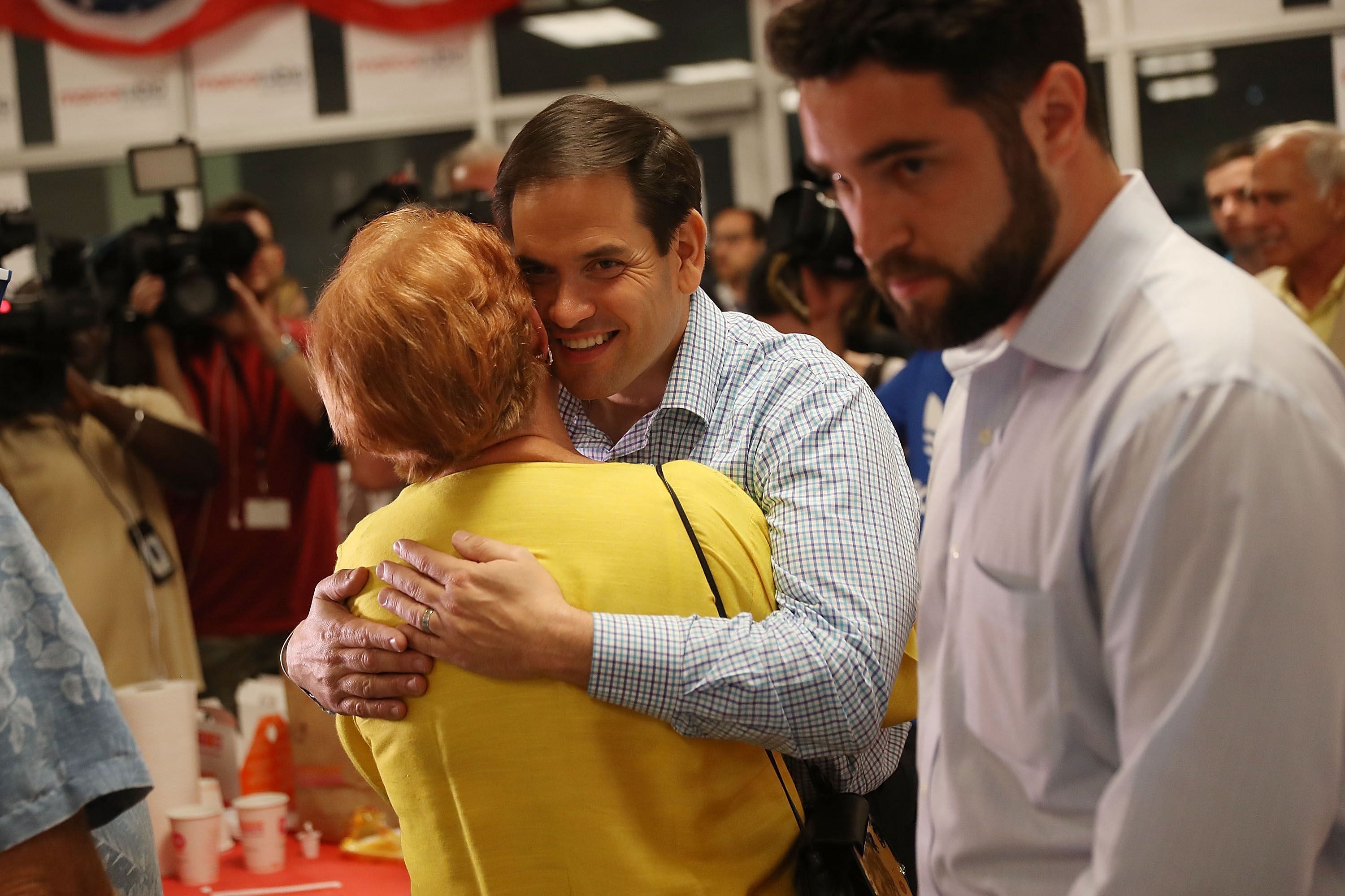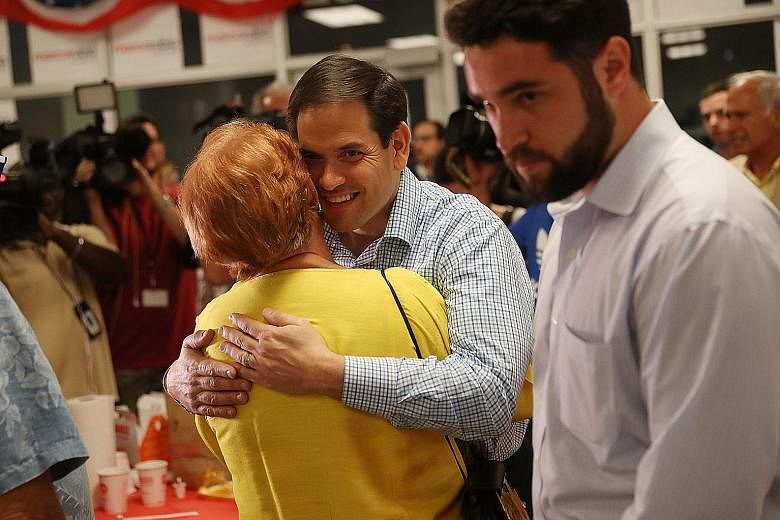WASHINGTON • Florida property developer Carlos Beruff adopted an interesting strategy in his attempt to become his state's Republican Party nominee for the Senate - he decided to make himself into Donald Trump.
The 58-year-old Cuban-American touted himself as a tough-talking political outsider with a hard line on immigration. He retrofitted Mr Trump's temporary ban on Muslims to his own needs, calling for a ban on all immigrants from the Middle East, and promised to put "America First".
"I'm no politician. I'm a business guy running for the Senate. The other guys are politicians looking for a promotion. Forget them. It's time to put America first," he said, in a Trump-esque television ad.
Newspapers in Florida promptly labelled him the "Cuban-American Donald Trump" and the "Little Trump of Florida".
In a way, the strategy made sense, given that Mr Beruff's main opponent in the primary was Senator Marco Rubio - a man who was trounced by Mr Trump in the presidential primary.

However, it didn't work.
Last week, Mr Rubio won the primary with 72 per cent to Little Trump's 18 per cent. This despite Mr Rubio deciding only two days before the registration deadline that he would defend his seat. The ease with which he vanquished his opponent was stunning primarily because it seemed to fly in the face of the ongoing political narrative.
This was supposed to be the year of the the outsider, when voters were clearly unhappy with Washington. Yet, here were voters who had already rejected the establishment candidate in the presidential race, turning around and roundly rejecting the outsider in the Senate race. And the phenomenon didn't just play out in Mr Rubio's race. Over the course of the past month, the establishment of both parties seemed to have made a comeback.
Arizona Republican Senator John McCain beat a challenger who said she wanted to "mix the mortar to fix the border", while Speaker Paul Ryan triumphed over a challenger who accused the Republican leader of betraying Mr Trump. Like Mr Rubio, Mr McCain and Mr Ryan also had uncomfortable relationships with the Republican presidential nominee. Yet, all three chalked up comfortable victories against candidates who embraced the tycoon. Mr McCain won by more than 12 points and Mr Ryan won by 68 points.
Over in the Democratic Party, controversial former party chair Debbie Wasserman Schultz comfortably fended off a challenger who had the backing of Senator Bernie Sanders. Mrs Wasserman Schultz had been forced to resign as party chair after e-mails emerged showing that the party was partial in its treatment of Mrs Hillary Clinton and Mr Sanders. The embattled congresswoman thus had to scrap all her onstage appearances at the Democratic National Convention she had spent months organising.
Meanwhile, her primary opponent, Mr Tim Canova, a 57-year-old law professor, was buoyed by the endorsement from Mr Sanders and raised more money than Mrs Wasserman Schultz in the months leading up to last week's vote. Still, she won by nearly 15 points.
Even given the built-in advantages that incumbents have in such elections, the large winning margins simply do not gel with the frequent diagnoses about the anti-establishment mood in the US. So what gives?
One very real possibility is that anti-establishment voters are simply not as reliable as their more pro-establishment brethren. After all, primary elections to pick nominees for a seat in the Senate or House of Representatives do not exactly get the blood pumping. The races tend to feature many unknown faces and the contests do not get much publicity in the media. Establishment candidates also tend to have stronger grassroots networks reaching out and urging potential voters to go vote.
As a result, the sort of people who might bother to turn up on a Tuesday to cast their vote are either political insiders with a higher-than-average interest in politics or those specifically targeted by establishment grassroots. It is likely that many of those who turned up when the presidential race was in town simply stayed home for this one.
Without exit polling data - and such races hardly ever draw out pollsters - it is impossible to confirm anything about the demographics of voters on the day, but it is clear that the turnout plunged. When Mr Trump beat Mr Rubio in March, some 2.35 million votes were cast by Republicans in Florida. Last week, that number was 1.43 million.
A second more intriguing possibility is that the anti-establishment movement has been misread.
That is not to suggest that the population has somehow become less angry - polls continue to find discontent with Washington at high levels - but perhaps what everyone thought angry voters wanted is wrong.
Dr Martin Cohen, an associate professor of political science at James Madison University, suggests it is possible that Mr Trump's example might have triggered some reconsideration among voters about how to move their cause forward. "I think the Republican Party is sort of shellshocked from Trump and they are realising that maybe it is not the best to just blow things up," he told The Straits Times, noting that a lot of the energy that people saw in the Tea Party movement in 2010 and 2014 doesn't seem to be present this year.
While the Tea Party movement - centred on fiscal conservatism - swept dozens of candidates into Congress in previous elections, that just does not seem to be happening in the same way for the Trump movement.
As New York Times columnist Frank Bruni noted: "The next Congress won't be full of Republicans who ran on Trump's signature ideas or have any... investment in them... There's less evidence of Republicans' moving en masse towards Trump's platform than of Trump himself retreating from it."
As with most cases, it is likely the explanation for recent results sits somewhere between the two theories. Anti-establishment voters are generally not the sort who would turn up for minor primaries, and even those who might have done so have decided that their appetite for disruption has been met. What is not yet clear is which force is stronger - and that has implications for the future of US politics.
If it is largely a question of enthusiasm and experience, then the sort of politics the US saw this year will be with it in the long run. Over time, as the Trump voters become more acquainted with the political process and Trump-like candidates build up their networks, the movement will slowly grow stronger.
If not, then what we are seeing play out is a slow reversion to normalcy after a roller-coaster of an election campaign.
Though voters wanted some chaos, they ultimately decided that one Donald Trump in American politics is enough.

